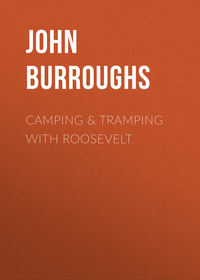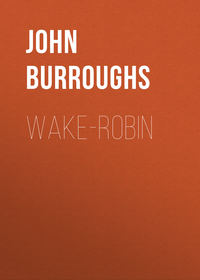 полная версия
полная версияWhitman: A Study
It has been urged that Whitman violates his own canon of the excellence of nature. But what he violates is more a secondary or acquired nature. He violates our social conventions and instincts, he exposes what we cover up; but the spirit of his undertaking demanded this of him. Remember that at all hazards he is to let nature – absolute nature – speak; that he is to be the poet of the body as well as of the soul, and that no part of the body of a man or woman, "hearty and clean," is vile, and that "none shall be less familiar than the rest."
His glory is, that he never flinched or hesitated in following his principle to its logical conclusions, – "my commission obeying, to question it never daring."
It was an heroic sacrifice, and atones for the sins of us all, – the sins of perverting, denying, abusing the most sacred and important organs and functions of our bodies.
VIn Whitman we find the most complete identification of the man with the subject. He always is, or becomes, the thing he portrays. Not merely does he portray America, – he speaks out of the American spirit, the spirit that has broken irrevocably with the past and turns joyously to the future; he does not praise equality, he illustrates it; he puts himself down beside the lowest and most despised person, and calls him brother.
"You felons on trial in courts,You convicts in prison-cells, you sentenced assassins chain'd and handcuff'd with iron,Who am I too that I am not on trial or in prison?Me ruthless and devilish as any, that my wrists are not chain'd with iron, or my ankles with iron?"He does not give a little charity, he gives himself as freely as the clouds give rain, or the sun gives light; he does not write a treatise on democracy, he applies the democratic spirit to everything in heaven and on earth, and redistributes the prizes from its points of view; he does not, except very briefly, sing the praises of science, but he launches his poems always from the scientific view of the world, in contradistinction to the old theological and mythical point of view. It is always the example, it is always the thing itself, he gives us. Few precepts, no sermon, no reproof. Does he praise candor? No, he is candor; he confesses to everything; he shows us the inmost working of his mind. We know him better than we know our nearest friends. Does he exalt the pride of man in himself, or egoism? Again he illustrates it: he is egoism; he makes the whole universe revolve around himself; he never for a moment goes out of himself; he does not seek a theme; he is the theme. His egocentric method of treatment is what characterizes him as an artist. He elaborates no theme, he builds nothing, he carves nothing, but makes himself a source and centre of pulsing, vital energy. Wave after wave radiates from him. What we see and get always is Walt Whitman. Our attention is never fixed upon the writer, but always upon the man.
Of course this method of Whitman of becoming one with his subject, and speaking out of it, is always the method of the creative artist. It is this that distinguishes the artist from the mere thinker or prose-writer. The latter tells us about a thing; the former gives us the thing, or the spirit of the thing itself.
If Whitman had put his criticism of our time and civilization in an argument or essay, the world would have received it very differently. As an intellectual statement or proposition, we could have played with it and tossed it about as a ball in a game of shuttlecock, and dropped it when we tired of it, as we do other criticism. But he gave it to us as a man, as a personality, and we find it too strong for us. It is easier to deal with a theory than with the concrete reality. A man is a summons and a challenge, and will not be easily put aside.
The great philosophical poets, like Lucretius, try to solve the riddles. Whitman's aim is only to thrust the riddles before you, to give you a new sense of them, and start the game afresh. He knows what a complex, contradictory thing the universe is, and that the most any poet can do is to break the old firmament up into new forms. To put his arms around it? No. Put your arms around your fellow-man, and then you have encompassed it as nearly as mortal can do.
VIWhitman's attraction toward the common people was real. There is one thing that makes every-day humanity, the great, toiling, unlettered masses, forever welcome to men who unite great imagination with broad sympathies, – they give a sense of reality; they refresh, as nature always refreshes. There is a tang and a sting to the native, the spontaneous, that the cultivated rarely has. The farmer, the mechanic, the sailor, the soldier, savor of the primal and the hardy. In painting his own portrait, Whitman makes prominent the coarser, unrefined traits, because here the colors are fast, – here is the basis of all. The careful student of Whitman will surely come to see how all the elements of his picture – his pride, his candor, his democracy, his sensuality, his coarseness, – finally fit together, and correct and offset each other and make a perfect unity.
No poet is so easily caricatured and turned into ridicule as Whitman. He is deficient in humor, and hence, like the Biblical writers, is sometimes on the verge of the grotesque without knowing it. The sense of the ridiculous has been enormously stimulated and developed in the modern mind, and – what is to be regretted – it has been mostly at the expense of the sense of awe and reverence. We "poke fun" at everything in this country; to whatever approaches the verge of the ridiculous we give a push and topple it over. The fear which all Americans have before their eyes, and which is much stronger than the fear of purgatory, is the fear of appearing ridiculous. We curb and check any eccentricity or marked individuality of manners or dress, lest we expose ourselves to the shafts of ridicule. Emerson said he had heard with admiring submission the remark of a lady who declared that the sense of being perfectly well dressed gave a feeling of inward tranquillity which religion was powerless to bestow; and what ranks before religion with us as a people is being in the mode, and writing our verse and cutting our coats in the approved style. Pride of the eye, a keen sense of the proprieties and the conventionalities, and a morbid feeling for the ridiculous, would have been death to Whitman's undertaking. He would have faltered, or betrayed self-consciousness. He certainly never could have spoken with that elemental aplomb and indifference which is so marked a feature of his work. Any hesitation, any knuckling, would have been his ruin. We should have seen he was not entirely serious, and should have laughed at him. We laugh now only for a moment; the spell of his earnestness and power is soon upon us.
VIIThoreau considered Whitman's "Leaves" worth all the sermons in the country for preaching; and yet few poets have assumed so little the function of the preacher. His great cure-all is love; he gives himself instead of a sermon. His faith in the remedial power of affection, comradeship, is truly Christ-like. Lover of sinners is also his designation. The reproof is always indirect or implied. He brings to bear character rather than precept. He helps you as health, as nature, as fresh air, pure water help. He says to you: —
"The mockeries are not you;Underneath them, and within them, I see you lurk;I pursue you where none else has pursued you:Silence, the desk, the flippant expression, the night, the accustomed routine, – if these conceal you from others,or from yourself, they do not conceal you from me.The shaved face, the unsteady eye, the impure complexion, – if these balk others, they do not balk me.The pert apparel, the deformed attitude, drunkenness, greed, premature death, – all these I part aside.I track through your windings and turnings, – I come upon you where you thought eye should never come upon you."Whitman said, in the now famous preface of 1855, that "the greatest poet does not moralize, or make applications of morals, – he knows the soul." There is no preaching or reproof in the "Leaves."
"I sit and look out upon all the sorrows of the world, and upon all oppression and shame;I hear secret convulsive sobs from young men, at anguish with themselves, remorseful after deeds done;I see, in low life, the mother misused by her children, dying, neglected, gaunt, desperate;I see the wife misused by her husband; I see the treacherous seducer of the young woman;I mark the ranklings of jealousy and unrequited love, attempted to be hid, – I see these sights on the earth,I see the workings of battle, pestilence, tyranny; I see martyrs and prisoners,I observe a famine at sea, – I observe the sailors casting lots who shall be killed, to preserve the lives of the rest,I observe the slights and degradations cast by arrogant persons upon laborers, the poor, and upon negroes,and the like;All these – all the meanness and agony without end I sitting look out upon,See, hear, and am silent."Only once does he shame and rebuke the offender; then he holds up to him "a hand-mirror."
"Hold it up sternly! See this it sends back! (who is it? is it you?)Outside fair costume, – within, ashes and filth.No more a flashing eye, – no more a sonorous voice or springy step,Now some slave's eye, voice, hands, step,A drunkard's breath, unwholesome eater's face, venerealee's flesh,Lungs rotting away piecemeal, stomach sour and cankerous,Joints rheumatic, bowels clogged with abomination,Blood circulating dark and poisonous streams,Words babble, hearing and touch callous,No brain, no heart left, no magnetism of sex;Such, from one look in this looking-glass ere you go hence,Such a result so soon – and from such a beginning!"The poet's way is so different from the moralist's way! The poet confesses all, loves all, – has no preferences. He is moral only in his results. We ask ourselves, Does he breathe the air of health? Can he stand the test of nature? Is he tonic and inspiring? That he shocks us is nothing. The first touch of the sea is a shock. Does he toughen us, does he help make arterial blood?
All that men do and are guilty of attracts him. Their vices and excesses, – he would make these his own also. He is jealous lest he be thought better than other men, – lest he seem to stand apart from even criminals and offenders. When the passion for human brotherhood is upon him, he is balked by nothing; he goes down into the social mire to find his lovers and equals. In the pride of our morality and civic well-being, this phase of his work shocks us; but there are moods when the soul says it is good, and we rejoice in the strong man that can do it.
The restrictions, denials, and safeguards put upon us by the social order, and the dictates of worldly prudence, fall only before a still more fervid humanism, or a still more vehement love.
The vital question is, Where does he leave us? On firmer ground, or in the mire? Depleted and enervated, or full and joyous? In the gloom of pessimism, or in the sunlight of its opposite? —
"So long!I announce a man or woman coming – perhaps you are the one;I announce a great individual, fluid as Nature, chaste, affectionate, compassionate, fully armed."So long!I announce a life that shall be copious, vehement, spiritual, bold,And I announce an old age that shall lightly and joyfully meet its translation."I announce myriads of youths, beautiful, gigantic, sweet-blooded;I announce a race of splendid and savage old men."There is no contradiction here. The poet sounds all the experiences of life, and he gives out the true note at last.
"No specification is necessary, – all that a male or female does, that is vigorous, benevolent, clean,is so much profit to him or her, in the unshakable order of the universe, and through thewhole scope of it forever."VIIINothing but the most uncompromising religious purpose can justify certain things in the "Leaves;" nothing but the most buoyant and pervasive spirituality can justify its overwhelming materiality; nothing but the most creative imagination can offset its tremendous realism; nothing but the note of universal brotherhood can atone for its vehement Americanism; nothing but the primal spirit of poesy itself can make amends for this open flouting of the routine poetic, and this endless procession before us of the common and the familiar.
IXWhitman loved the word "unrefined." It was one of the words he would have us apply to himself. He was unrefined, as the air, the soil, the water, and all sweet natural things are unrefined (fine but not refined). He applies the word to himself two or three times in the course of his poems. He loved the words sun-tan, air-sweetness, brawn, etc. He speaks of his "savage song," not to call forth the bards of the past, he says, but to invoke the bards of the future.
"Have I sung so capricious and loud my savage songs?"The thought that his poems might help contribute to the production of a "race of splendid and savage old men" was dear to him. He feared the depleting and emasculating effects of our culture and conventions. The decay of maternity and paternity in this country, the falling off of the native populations, were facts full of evil omen. His ideal of manly or womanly character is rich in all the purely human qualities and attributes; rich in sex, in sympathy, in temperament; physiologically sound and clean, as well as mentally and morally so.
"Fear grace, fear delicatesse;Fear the mellow-sweet, the sucking of honey-juice:Beware the advancing mortal ripening of nature!Beware what precedes the decay of the ruggedness of states and men."He was himself the savage old man he invoked. It was no part of his plan to preach, in refined and euphonious terms, hygiene and the value of the natural man, but to project into literature the thing itself, to exploit a character coarse as well as fine, and to imbue his poems with a physiological quality as well as a psychological and intellectual.
"I will scatter the new roughness and gladness among them."He says to the pale, impotent victim of over-refinement, with intentional rudeness,
"Open your scarf'd chops till I blow grit within you."XOne of the key-words to Whitman both as a man and a poet is the word "composite." He was probably the most composite man this century has produced, and in this respect at least is representative of the American of the future, who must be the result of the blending of more diverse racial elements than any man of history. He seems to have had an intuition of his composite character when he said in his first poem: —
"I am large, – I contain multitudes."The London correspondent of the "New York Tribune," in reluctantly conceding at the time of the poet's death something to the British admiration of him, said he was "rich in temperament." The phrase is well chosen. An English expert on the subject of temperament, who visited Whitman some years ago, said he had all four temperaments, the sanguine, the nervous, the melancholic, and the lymphatic, while most persons have but two temperaments, and rarely three.
It was probably the composite character of Whitman that caused him to attract such diverse and opposite types of men, – scholars and workingmen, lawyers, doctors, scientists, and men of the world, – and that made him personally such a puzzle to most people, – so impossible to classify. On the street the promenaders would turn and look after him, and I have often heard them ask each other, "What man was that?" He has often been taken for a doctor, and during his services in the army hospitals various myths were floating about concerning him. Now he was a benevolent Catholic priest, – then some unknown army general, or retired sea captain; at one time he was reputed to be one of the owners of the Cunard line of steamers. To be taken for a Californian was common. One recalls the composite character of the poet whom he outlines in his poems (see quotation, page 159).
The book is as composite as the man. It is all things to all men; it lends itself to a multitude of interpretations. Every earnest reader of it will find some clew or suggestion by the aid of which he fancies he can unlock the whole book, but in the end he will be pretty sure to discover that one key is not enough. To one critic, his book is the "hoarse song of a man," its manly and masculine element attracts him; to another he is the poet of joy, to another the poet of health, to still another he is the bard of personality; others read him as the poet of nature, or the poet of democracy. His French critic, Gabriel Sarrazin, calls him an apostle, – the apostle of the idea that man is an indivisible fragment of the universal Divinity.
XIWhat has a poet of Whitman's aims to do with decency or indecency, with modesty or immodesty? These are social or conventional virtues; he represents mainly primary qualities and forces. Does life, does death, does nature, respect our proprieties, our conventional veils and illusions? Neither will he. He will strip them all away. He will act and speak as if all things in the universe were equally sacred and divine; as if all men were really his brothers, all women his sisters; as if all parts of the human body were equally beautiful and wonderful; as if fatherhood and motherhood, birth and begetting, were sacred acts. Of course it is easy to see that this course will speedily bring him in collision with the guardians of taste and social morality. But what of that? He professes to take his cue from the elemental laws. "I reckon I behave no more proudly than the level I plant my house by." The question is, Is he adequate, is he man enough, to do it? Will he not falter, or betray self-consciousness? Will he be true to his ideal through thick and thin? The social gods will all be outraged, but that is less to him than the candor and directness of nature in whose spirit he assumes to speak.
Nothing is easier than to convict Walt Whitman of what is called indecency; he laughs indifferent when you have done so. It is not your gods that he serves. He says he would be as indifferent of observation as the trees or rocks. And it is here that we must look for his justification, upon ethical rather than upon the grounds of conventional art. He has taken our sins upon himself. He has applied to the morbid sex-consciousness, that has eaten so deeply into our social system, the heroic treatment; he has fairly turned it naked into the street. He has not merely in words denied the inherent vileness of sex; he has denied it in very deed. We should not have taken offense had he confined himself to words, – had he said sex is pure, the body is as clean about the loins as about the head; but being an artist, a creator, and not a mere thinker or preacher, he was compelled to act, – to do the thing instead of saying it.
The same in other matters. Being an artist, he could not merely say all men were his brothers; he must show them as such. If their weakness and sins are his also, he must not flinch when it comes to the test; he must make his words good. We may be shocked at the fullness and minuteness of the specification, but that is no concern of his; he deals with the concrete and not with the abstract, – fraternity and equality as a reality, not as a sentiment.
XIIIn the phase in which we are now considering him, Whitman appears as the Adamic man re-born here in the nineteenth century, or with science and the modern added, and fully and fearlessly embodying himself in a poem. It is stronger than we can stand, but it is good for us, and one of these days, or one of these centuries, we shall be able to stand it and enjoy it.
"To the garden the world anew ascending,Potent mates, daughters, sons, preluding,The love, the life of their bodies, meaning and being,Curious, here behold my resurrection, after slumber,The revolving cycles, in their wide sweep, having brought me again,Amorous, mature – all beautiful to me – all wondrous,My limbs, and the quivering fire that ever plays through them, for reasons most wondrous;Existing, I peer and penetrate still,Content with the present – content with the past,By my side, or back of me, Eve following,Or in front, and I following her just the same."The critics perpetually misread Whitman because they fail to see this essentially composite and dramatic character of his work, – that it is not the song of Walt Whitman the private individual, but of Walt Whitman as representative of, and speaking for, all types and conditions of men; in fact, that it is the drama of a new democratic personality, a character outlined on a larger, more copious, more vehement scale than has yet appeared in the world. The germs of this character he would sow broadcast over the land.
In this drama of personality the poet always identifies himself with the scene, incident, experience, or person he delineates, or for whom he speaks. He says to the New Englander, or to the man of the South and the West, "I depict you as myself." In the same way he depicts offenders, roughs, criminals, and low and despised persons as himself; he lays claim to every sin of omission and commission men are guilty of, because, he says, "the germs are in all men." Men dare not tell their faults. He will make them all his own, and then tell them; there shall be full confession for once.
"If you become degraded, criminal, ill, then I become so for your sake;If you remember your foolish and outlaw'd deeds, do you think I cannot remember my own foolishand outlaw'd deeds?"It will not do to read this poet, or any great poet, in a narrow and exacting spirit. As Whitman himself says: "The messages of great poems to each man and woman are: Come to us on equal terms, only then can you understand us."
In the much misunderstood group of poems called "Children of Adam" the poet speaks for the male generative principle, and all the excesses and abuses that grow out of it he unblushingly imputes to himself. What men have done and still do, while under the intoxication of the sexual passion, he does, he makes it all his own experience.
That we have here a revelation of his own personal taste and experiences may or may not be the case, but we have no more right to assume it than we have to assume that all other poets speak from experience when they use the first person singular. When John Brown mounted the scaffold in Virginia, in 1860, the poet says: —
"I was at hand, silent I stood with teeth shut close, I watch'd,I stood very near you, old man, when cool and indifferent, but trembling with age and your unheal'd wounds,you mounted the scaffold," —very near him he stood in spirit; very near him he stood in the person of others, but not in his own proper person.
If we take this poet literally, we shall believe he has been in California and Oregon; that he has set foot in every city on the continent; that he grew up in Virginia; that every Southern State has been by turns his home; that he has been a soldier, a sailor, a miner; that he has lived in Dakota's woods, his "diet meat, his drink from the spring;" that he has lived on the plains with hunters and ranchmen, etc. He lays claim to all these characters, all these experiences, because what others do, what others assume, or suffer, or enjoy, that he appropriates to himself.
"I am the hounded slave, I wince at the bite of the dogs,Hell and despair are upon me, crack and again crack the marksmen,I clutch the rails of the fence, my gore dribs, thinned with the ooze of my skin,I fall on the weeds and stones,The riders spur their unwilling horses, haul close,Taunt my dizzy ears, and beat me violently over the head with whipstocks."Agonies are one of my changes of garments,I do not ask the wounded person how he feels – I myself become the wounded person,My hurts turn livid upon me as I lean on a cane and observe."I become any presence or truth of humanity here,See myself in prison shaped like another man,And feel the dull unintermitted pain."For me the keepers of convicts shoulder their carbines and keep watch,It is I let out in the morning and barred at night.Not a mutineer walks hand-cuffed to the jail, but I am hand-cuffed to him and walk by his side."XIIIIt is charged against Whitman that he does not celebrate love at all, and very justly. He had no purpose to celebrate the sentiment of love. Literature is vastly overloaded with this element already. He celebrates fatherhood and motherhood, and the need of well-begotten, physiologically well-begotten, offspring. Of that veiled prurient suggestion which readers so delight in – of "bosoms mutinously fair," and "the soul-lingering loops of perfumed hair," as one of our latest poets puts it – there is no hint in his volume. He would have fallen from grace the moment he had attempted such a thing. Any trifling or dalliance on his part would have been his ruin. Love as a sentiment has fairly run riot in literature. From Whitman's point of view, it would have been positively immoral for him either to have vied with the lascivious poets in painting it as the forbidden, or with the sentimental poets in depicting it as a charm. Woman with him is always the mate and equal of the man, never his plaything.









